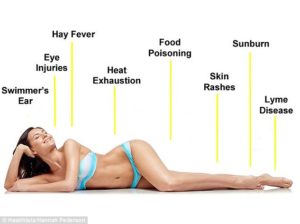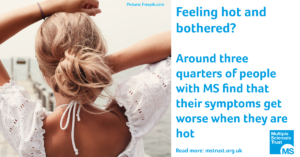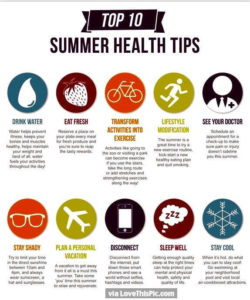Hot weather has its hazards, from rip tides to shark scares to sunburn and close encounters with poisonous plants. Simply step outside on a hot summer evening and you’re bound to become instant mosquito bait.
There are less well-known summer health hazards you should keep in mind. Hazards that affect your body from within. Here are some summer health ailments that get worse as the temperatures rise.
1. Kidney Stones
Climate change is affecting not only our planet, it’s taking a toll on our health. Case in point: A University of Texas study has found that the incidence of kidney stones will increase in step with rising record temperatures. Researchers predict a huge increase in kidney stones by 2050. To help prevent kidney stones, which are made up of mineral and acid salts, the Mayo Clinic advises staying well-hydrated (which also will help protect you from heat stroke) when the weather’s sultry. It’s important to keep levels of protein, sugar and sodium (especially) in your diet low. Note that if you live in a warm part of the country or tend to sweat a lot, you may be at higher risk of kidney stones.
2. Migraine headaches
As the temperature rises, so does the risk of migraine for someone who’s prone to them. A study of more than 7,000 emergency room patients who came in for migraine symptoms during a seven-and-a-half-year period revealed that for every 9 degree F bump in temperature, migraine cases increased. To head off migraines in summer, the Cleveland Clinic advises staying hydrated (rely on water and other non-caffeinated beverages) with eating regular meals no matter how busy you are (your bike partner can wait) and steering clear of common migraine triggers if they affect you. Some you’re likely to encounter in summer are like hot dogs, pickles, beer and certain cheeses.
3. Rosacea
Sun exposure, elevated temperatures and wind — hallmarks of summer weather — can bring rosacea flare-ups. If you have rosacea, a skin condition that causes redness, bumps, eye irritation and thickening of skin around the face and other parts of the body, fend off flare-ups!
Tips from the National Rosacea Society:
- Apply sunscreen at least 30 minutes before heading out and reapply every couple of hours.
- If you can, stay out of the sun when it’s at its strongest (between 10 a.m. – 4 p.m.)Head outside early in the morning or late in the afternoon to stay cool and avoid the heat that may trigger a flare-up
- Add a wide-brimmed hat and a good pair of shades protect your face and eyes from UV rays.
4. Heart attack
Winter may be peak season for heart attacks, but summer heat also can take a toll on people with cardiovascular disease or who are at risk for it, according to the American Association of Heart Failure Nurses (AAHFN). That’s because high temperatures increase heart rate and lower blood pressure. Folks with weak hearts may not be able to pump enough blood to cool their bodies and can quickly become overheated. If you have heart problems, the AAHFN recommends you stay inside on blistering days, make sure you drink enough fluids (and back off of caffeine and alcohol) to keep you hydrated and have someone on speed dial who can get to you quickly if you need help.
5. Asthma
Summer whims can spell trouble for people with asthma. When air temperatures change suddenly — as when the thermometer plummets just before a thunderstorm — it can bring on asthma symptoms, according to the American Lung Association. Asthma sufferers also may have trouble breathing in outdoor air pollution as well as when ozone levels are high, which occurs more often in the summer. If you have asthma, your best protection is prevention: Keep a check on daily air quality and, if you live in a city, heed the smog warnings that often occur on steamy days. If the weather outside seems frightful, stay indoors as much as possible.
6. Summer Ozone Dangers
As the weather heats up during the summer months, ground-level ozone pollution increases as pollutants react to heat and sunlight. So if going on vacation from non ozone levels to danger ozone areas be careful. Ozone levels often increase with summer wildfires, further worsening the air quality and ozone-related breathing issues. Areas consider high in danger ozone areas are Bishop, CA, Great Basin Air District, CA, Bishop Paiute Tribe, CA, Southern Ute Indian Reservation, CO, Tallahassee, FL
| Bishop, CA |
|
|||
| Great Basin Air District, CA |
|
|||
| Bishop Paiute Tribe, CA |
|
|||
| Southern Ute Indian Reservation, CO |
|
|||
| Tallahassee, FL
Go to www.airnow.gov |
Exposure to ground-level ozone can exacerbate chronic respiratory symptoms, reduce lung capacity and be a trigger for asthma attacks. Other conditions affected by high ozone levels in the summertime include COPD, heart disease and diabetes.
7. Eczema Flare Ups
Yes those of us suffering from eczema understand very well that winter months can be the toughest time of year – dry air, cold temperature, low humidity making skin susceptible to eczema breakouts and flares. Remember that also here’s a plenty of sunshine, high humidity and warm temperature. All weather conditions that is ideal for eczema.
Hot weather makes everyone sweat more. Sweating is our natural defense mechanism to control the body’s temperature. Sweat consists of mostly water. As water evaporates from the skin surface, it provides a natural cooling sensation and also lowers the body temperature. In addition to water, there are trace amounts of sodium, potassium, calcium, magnesium, lactic acid, urea, copper, zinc, nickel, iron, chromium and lead in the sweat. Many of these chemicals, if presented at a high enough concentration, may be irritating to the skin.
Hot weather worsens the itch, blockage of sweat glands, and other bad summer exposures are chlorine it can wreak havoc on your skin and hair. For one thing, chlorinated water can definitely dry out your skin. Also, to prevent skin cancer, premature aging, and sunburn, it is a good idea to use sunscreens.
Titan Medical (https://titanmedicalaesthetics.com/blog/how-summer-heat-affects-your-skin)


